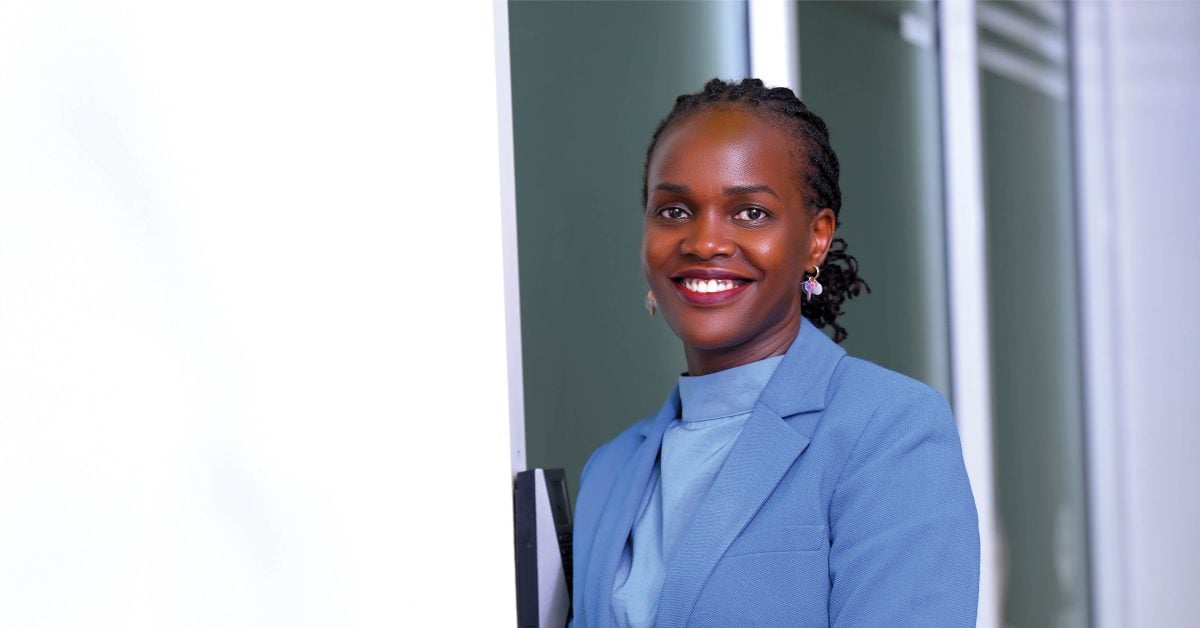This article was produced with the support of UDB
Patricia Ojangole, the managing director of Uganda Development Bank (UDB), views her role at the helm of the bank as more than just a job – it’s a powerful platform to empower women. Since taking the reins in 2012 she has been a tireless advocate for gender equality within UDB. Her optimism is infectious, and under her leadership, the bank has seen a notable increase in female representation: “45% of the Bank’s staff are female, with over 20 females serving in various managerial roles,” she tells African Business.
Ojangole attributes this progress to the Bank’s culture of inclusivity and merit-based advancement, which she notes has helped foster a work environment where all staff, irrespective of gender, can thrive and reach their full potential.
“I do not believe that women are less capable than men when it comes to work. I therefore expose them to the same opportunities that are available to men and give them the same expectations that I expect from male colleagues. This is our culture and work environment in which we respect everyone,” she says.
Crucially, UDB is not only promoting gender equality within its ranks, but also more widely in Ugandan society. It’s doing so through a suite of financial products and services specifically designed to cater for the unique needs of women in Uganda. A shining example of this is UDB’s Women Financing Segment. Established in 2021, this business unit is dedicated to the development of gender-responsive financial products and services. Its mission is threefold: supporting women entrepreneurs, investing in sectors that predominantly employ women, and addressing women’s consumer needs.
Providing funding and training
UDB’s flagship women’s financing product is its Women Prosper Loans product. Ojangole notes that the product is a key component of the Bank’s gender-lens investment plan. “Women Prosper has emerged as a powerful impact investment strategy that combines pursuing financial returns with pursuing gender equality and social well-being.”
She believes that the product’s early success underscores its relevance in addressing an unmet market need. “In 2023, after one year of rolling out this product, 16% of the special programme projects funded were women-owned as defined by the Bank’s criteria.”
Ojangole notes that the Bank has allocated up to 20% of its core capital for financing qualifying enterprises under the Bank’s “Special Programs” provision, which exists to serve SMEs, women-led businesses, and youth-linked ventures. Beyond its own financial commitment, UDB aims to catalyse new sources of finance and bring about financial innovations, such as the introduction of Loan Guarantees, to support women-owned enterprises with collateral challenges. In this regard, UDB and the African Guarantee Fund (AGF) entered a partnership worth 16bn Ugandan shillings (approximately $4m) in January to enhance sustainable lending to qualifying enterprises under the bank’s Special Programs proposition.
Training is another crucial component of UDB’s proposition to women-owned enterprises. Through its Business Accelerator programme, UDB provides training to both existing and prospective clients. Ojangole says that over 2000 women have benefited from the initiative in the last 18 months. “UDB employs a mix of training and incubation programmes, advisory as well as technical support to meet this aspiration.”
Multiple studies have shown that training programmes can equip women entrepreneurs with essential business skills, such as financial management, marketing, and strategic planning. This can help them make informed decisions and run their businesses more effectively.
UDB has also entered into partnerships with several women’s organisations around the country to strengthen its appeal and reach more prospective women clients. “The Bank has partnered with umbrella women’s organisations with a membership of 2.5m women member enterprises based on a mutually beneficial relationship.”
Digital financial services key for women
Digital financial services are a game changer for women, rural populations and other groups that have been traditionally overlooked by the formal financial system. UDB is one of the players leading the charge in Uganda, with a keen focus on expanding its digital offerings to women farmers.
The Bank has forged partnerships with fintech firms to enhance credit access to smallholder farmers. One such partnership with fintech firm Ensibuuko Technologies provides short-term seasonal loans to smallholder farmers in remote areas with financing needs as low as 50,000 Ugandan shillings (approximately $12). The entire process, from application to approval and disbursement, is digital, with funds transferred directly to the farmers’ e-mobile wallets. This fintech solution, dubbed Agriconnect, aims to extend credit to the underserved on a large scale. Ojangole notes that these digital initiatives are complemented by traditional options like the UDB Women Prosper Loan.
Ojangole, however, contends that despite strong growth in adoption of digital financial services by women in Uganda, sustained efforts are needed to bring women on par with men. According to the National Financial Inclusion Strategy – developed by the Bank of Uganda and the country’s finance ministry – women are trailing behind men in utilising digital financial services. The gender gap is evident in the use of mobile money, with only 25% of Ugandan women using it, compared to 38% of men.
Furthermore, women are at a disadvantage when it comes to owning accounts, making digital transactions, saving, borrowing money, and understanding financial services. According to Ojangole, this gender disparity persists in both digital and non-digital financial inclusion. She believes that the answer to getting more women to use digital financial services lies in investing in innovative financing solutions.
Dreaming big
“The majority of financially excluded women are in the informal sector and hard-to-reach areas, which requires innovative financing solutions to reach out to them. Innovations in digital financial inclusion with a special focus on women is, therefore, necessary to improve the financial inclusion standing of the women.”
According to Ojangole, female entrepreneurs in Uganda should not shy away from dreaming big. With backing from lenders like UDB, these women are encouraged to scale up their businesses for a more significant economic and societal impact.
“While the government of Uganda has successfully helped women to start small businesses through initiatives such as the Uganda Women Entrepreneurship Program, more female entrepreneurs need to move into the larger business space to drive Uganda’s industrial transition.”
Ojangole believes that African financial institutions can take a leaf out of UDB’s book. By implementing specialised lending and business development services for women, they can advance women’s economic empowerment. But it doesn’t stop there. Ojangole insists that financial institutions must monitor and document their progress in advancing women’s empowerment, ensuring they hold themselves accountable to their commitments. “The Bank, every month, tracks sustainability indicators with a focus on enabling inclusive prosperity.”
 Sign in with Google
Sign in with Google 



